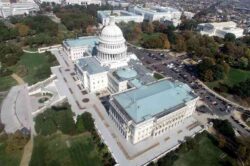Minneapolis teacher contract race language ignites firestorm

Lindsey West, a fifth-grade teacher at Clara Barton Community School in Minneapolis who identifies as Black and Indigenous, poses at her home in suburban Minneapolis on Friday, Aug. 19, 2022.
10:33 JST, August 22, 2022
MINNEAPOLIS (AP) — When Minneapolis teachers settled a 14-day strike in March, they celebrated a groundbreaking provision in their new contract that was meant to shield teachers of color from seniority-based layoffs and help ensure that students from racial minorities have teachers who look like them.
Months later, conservative media outlets have erupted with denunciations of the policy as racist and unconstitutional discrimination against white educators. One legal group is looking to recruit teachers and taxpayers willing to sue to throw out the language. The teachers union paints the dispute as a ginned-up controversy when there’s no imminent danger of anyone losing their job. Meanwhile, the feud is unfolding just months ahead of arguments in a pair of U.S. Supreme Court cases that could reshape affirmative action.
“The same people who want to take down teachers unions and blame seniority are now defending it for white people,” said Greta Callahan, president of the teachers unit at the Minneapolis Federation of Teachers. “This is all made up by the right wing now. And we could not be more proud of this language.”
Recent coverage in conservative platforms such as the local news website Alpha News, Fox News nationally and the Daily Mail internationally sparked criticisms from prominent figures, including Donald Trump Jr. and former Wisconsin Gov. Scott Walker, who curbed the power of public employee unions in his state. Walker on Twitter called it “another example of why government unions should be eliminated.”
The contract language doesn’t specifically say that white teachers would be laid off ahead of teachers of color, though critics say that’s what the effect would be. The contract exempts “teachers who are members of populations underrepresented among licensed teachers in the District,” as well as alumni of historically Black and Hispanic colleges, and of tribal colleges. Around 60% of the district’s teachers are white, while more than 60% of the students are from racial minorities.
Advocates say students from racial minorities perform better when their educators include teachers and support staff of color, and that it’s especially critical in a district that suffers from stubborn achievement gaps. Callahan said her union fought for years to get the protection added to their contract, and that she knows of two other Minnesota districts with similar provisions.
Minneapolis is one of many districts across the U.S. struggling with declining teacher headcounts and tight budgets. But Callahan disputed that the provision threatens anyone’s job, noting that Minneapolis has nearly 300 unfilled positions as teachers and students prepare to go back to school, and the language won’t take effect until the 2023 academic year.
Callahan called it “just one teensy, tiny step towards equity” that doesn’t begin to make up for many teachers of color quitting the district in recent years because they felt underpaid and disrespected.
To Lindsey West, a fifth grade teacher at Clara Barton Community School who identifies as Black and Indigenous, the seniority language is one piece of a bigger mission of improving education.
West said she feels strongly that students of color benefit from having teachers that look like them, but said she’s also seen that diversity can be empowering for white students. She said she’s sometimes been the first educator of color that Black or white students have had.
“We want to have kids from all demographics having experiences with people of different backgrounds and different cultures, and becoming aware that our shared humanity is what’s important, and not the things that divide us,” West said.
Minneapolis Public Schools interim Superintendent Rochelle Cox declined a request for an interview.
“The object of this provision is clearly to lay off white teachers first, regardless of merit, based on the color of their skin, and that is a big problem under the Constitution and the 14th Amendment,” said James Dickey, senior trial counsel at the Upper Midwest Law Center, a conservative nonprofit that often takes on public employee unions. It has brought litigation over such issues as COVID-19 mask mandates and displays of Black Lives Matter posters.
Dickey said his group is considering suing and has had a flood of Minneapolis taxpayers — and some teachers — contact them to say they are “offended that my tax dollars could go to fund this kind of racist agenda.”
He argued that a 1986 U.S. Supreme Court decision known as the Wygant case bars such provisions and would serve as a precedent in Minnesota.
The Wygant case involved a teachers contract in Jackson, Michigan, which took a different approach from the Minneapolis agreement. It effectively said Jackson could not make cuts that led to an overall reduction in the percentage of minority personnel employed in the district. White teachers sued after being laid off while some teachers of color with less seniority kept their jobs. A divided Supreme Court held that the layoffs violated the equal protection clause of the U.S. Constitution.
Andrew Crook, spokesman for the American Federation of Teachers, said he didn’t know of anything similar to the Minneapolis wording in contracts in other states, though he said some contracts provide exceptions from straight seniority rules for teachers in hard-to-fill specialties such as math and special education.
Officials with other national public employee unions and professional associations either said they didn’t know of anything similar in their fields or did not respond to requests for comment.
Two affirmative action cases set for oral arguments before the Supreme Court in October, involving Harvard University and the University of North Carolina, could have a bearing on the Minneapolis dispute. The cases are challenges to the consideration of race in college admission decisions.
Affirmative action has been reviewed by the high court several times over the past 40 years and has generally been upheld, but with limits. With three new conservative justices on the court since its last review, however, the practice may be facing its greatest threat yet.
Joseph Daly, a professor emeritus at the Mitchell Hamline School of Law who arbitrates disputes across the country, including many teacher cases over the years, said the Minneapolis language appears designed to survive a court challenge.
“The U.S. Supreme Court in the past has OK’d affirmative action when there were very valid objectives to be achieved in ultimately seeking equality for all human beings,” Daly said. “Now the question of today is: Will this concept be upheld by the courts in light of the more conservative stance on the Supreme Court? I don’t have an answer on that.”







